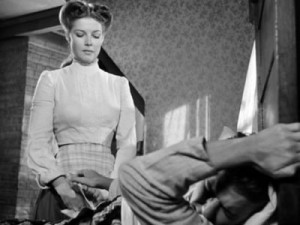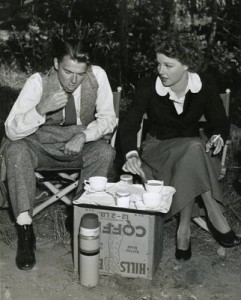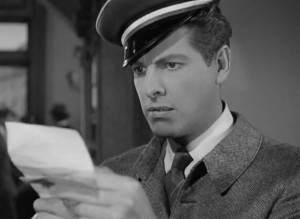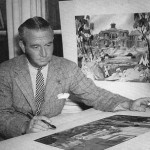 Drake (Douglas Croft) and Parris explore the railroad yards and, joined by Randy (Ann Todd), swing on the rings at Elroy’s icehouse. This accompanying jaunty music segues into a dark and sinister tableau as Drake and Parris come upon Willie (Henry Blair), whose father is undergoing an operation without anesthesia, conducted by Dr. Gordon (Coburn). Terrified, Willie bangs on the locked front door, screaming against the doctor. Parris and Drake flee in panic. The scene must strike some degree of terror in the viewer as well, even more so for the movie-goer in 1942, when this depiction of children in pain must have seemed profoundly frightening.
Drake (Douglas Croft) and Parris explore the railroad yards and, joined by Randy (Ann Todd), swing on the rings at Elroy’s icehouse. This accompanying jaunty music segues into a dark and sinister tableau as Drake and Parris come upon Willie (Henry Blair), whose father is undergoing an operation without anesthesia, conducted by Dr. Gordon (Coburn). Terrified, Willie bangs on the locked front door, screaming against the doctor. Parris and Drake flee in panic. The scene must strike some degree of terror in the viewer as well, even more so for the movie-goer in 1942, when this depiction of children in pain must have seemed profoundly frightening.
On Parris’ way home, about to step over the stile near the von Eln estate, Cassie appears crying, telling him she won’t be going to school any more, that her father will tutor her, then flees. Korngold introduces a second, now disturbing theme for her. After an extremely tight close-up of Parris, he crosses the stile, followed by one of those cinematic time dissolves: the fence and stile age, the grass grows higher and on the steps come the shoes, not of a child but of a man. The figure steps down into camera view as the camera simultaneously tilts up to the mature face of Parris Mitchell, all accompanied by an heroic restatement of the Kings Row theme in the orchestral garb of the main title.
Next Parris is met on the road by Drake in his buggy with the Ross sisters, Poppy (Julie Warren) and Ginny (Mary Scott). Parris explains he’s on his way to his first medical session with Dr. Tower and can’t join the carefree trio, who continue on down the road in the buggy, singing and laughing.
In Parris’ approach to the Tower porch, he steps from light into shadow, another hint that something, maybe sinister and secretive, lies within. In a later visit, there are spidery shadows of leaves on a pillar of the porch, a timeless Hollywood symbol of distress, uneasiness or confusion, in this case insanity. Dr. Tower discusses the new discipline of psychiatry, how happy psychic man was before the thirteenth century and his theory of medicine: “It is a game in which man pits his brains against the forces of destruction and disease.”
In one of the film’s highlights, the blending of James Wong Howe’s cinematography and Korngold’s music, Parris returns to the Tower house to retrieve a book he has forgotten. Parris’ race through the thunderstorm to the house is accompanied by a great Korngoldian outburst. Cassie says her father is away in St. Louis. The two young people are drawn to each other, but she is torn between her passion and her fear, and the thunderstorm only adds to the drama. Korngold mingles the two Cassie themes with jabs of his own musical thunder, and the scene culminates in a frantic love theme.
 From here on tragedies begin aplenty. What follows could easily degenerate into soap opera clichés were the material and acting not of a higher order. Grandmother Eln dies, Dr. Tower kills Cassie and then himself; Drake becomes destitute through a bank fraud, is injured in a railroad accident, his legs are unnecessarily amputated by the sadistic Dr. Gordon; Louise (Nancy Coleman) demands her father be exposed and her mother (Judith Anderson) wants to silence her daughter in an asylum.
From here on tragedies begin aplenty. What follows could easily degenerate into soap opera clichés were the material and acting not of a higher order. Grandmother Eln dies, Dr. Tower kills Cassie and then himself; Drake becomes destitute through a bank fraud, is injured in a railroad accident, his legs are unnecessarily amputated by the sadistic Dr. Gordon; Louise (Nancy Coleman) demands her father be exposed and her mother (Judith Anderson) wants to silence her daughter in an asylum.
One of those negatives in Kings Row is the unfortunate perpetuation of the Southern Negro stereotype, even though the film is set in the Midwest. Hattie Noel as Daisy the maid (what else?!), amazed that little Parris Mitchell has grown up, says, “Youz de doctor now,” even adding the Hattie McDaniel “um, um, um” and a shake of the head from Gone With the Wind. In fact, Noel lost out to McDaniel as Mammy in the Selznick epic.
 As the children are leaving school in the opening scene, a little girl on the left momentarily looks directly into the camera. The actress Ann Todd, who plays Randy Monoghan as a child, did not grow up to become the British leading lady Ann Todd who starred in The Seventh Veil and the less impressive The Paradine Case, and died in 1993. This Ann Todd, later changing her name to Ann E. Todd, dropped out of movies in the early 1950s and pursued a career in music history. As of this writing, she is still alive.
As the children are leaving school in the opening scene, a little girl on the left momentarily looks directly into the camera. The actress Ann Todd, who plays Randy Monoghan as a child, did not grow up to become the British leading lady Ann Todd who starred in The Seventh Veil and the less impressive The Paradine Case, and died in 1993. This Ann Todd, later changing her name to Ann E. Todd, dropped out of movies in the early 1950s and pursued a career in music history. As of this writing, she is still alive.
Perhaps when script writer Robinson pruned the Bellamann novel of much of its naughtiness, he overlooked, or perhaps left intentionally, a few slight suggestions of homosexuality. Parris and Drake do seem exceptionally close. On several occasions Drake sits awfully close to Parris. When Parris arrives at Drake’s house after a night with Cassie, Drake remarks, “Come on, pile into bed. Of course, you’ll have to bunk with me.” After a long separation, when Parris greets his friend after the accident, their faces are a few inches apart and Drake has the look of a man about to kiss a woman!
The super optimistic ending, everything coming ’round right, however, might be too over the top for cynical modern audiences. Parris tells Drake that his amputations were probably unnecessary and spouts his newly learned psychiatric jargon, including that line about “strange shadows,” and quotes Invictus: “Out of the night that covers me,/Black as the Pit from pole to pole . . . ” Drake laughs it off: “Where did Gordon think I lived—in my legs? Did he think those things were Drake McHugh?!” A heretofore silent chorus bursts from the soundtrack, reaffirming the Invictus words, and Parris races across a meadow to meet a new-found love (Kaaren Verne).
 Not to worry. Don’t be put off by this last bit of happy ending schmaltz. Kings Row is one of the great movies, mature for the 1940’s, far ahead of its time, a darker film than I remembered after being away from it for years, marred only by Cummings’ weak performance. Besides the mature script, Sam Wood’s direction, Korngold’s music and a dozen other pluses, there is the production design by William Cameron Menzies, whose cloud-streaked skyscapes are reminiscent of his work in Gone With the Wind.
Not to worry. Don’t be put off by this last bit of happy ending schmaltz. Kings Row is one of the great movies, mature for the 1940’s, far ahead of its time, a darker film than I remembered after being away from it for years, marred only by Cummings’ weak performance. Besides the mature script, Sam Wood’s direction, Korngold’s music and a dozen other pluses, there is the production design by William Cameron Menzies, whose cloud-streaked skyscapes are reminiscent of his work in Gone With the Wind.
And last, the film underlines the power and drama of black and white, its out-and-out superiority—yes, superiority—over color, even British colour! Watching Kings Row, one wonders if Warner Bros. didn’t make, after all, the sharpest, clearest, most dynamic black and white films of any studio. With much due to the combined talents of Howe and Menzies, the technical scène de résistance is the night in the railroad yard between Randy and Drake, when he reads a letter from Parris. The contrasts and depth perspective are electrifying, and it’s easy to imagine how much time was spent setting up that scene.
All was possible in Hollywood’s Golden Age.
.
I adore this film. I agree that the score is one of the best I ever heard and informs the story. I did like Bob Cummings “is he gay or not gay” boyish interpretation of Parris. This is a true classic that is forgotten today but a must for any serious lover of movies and movie music.
I’ve loved this film forever. The Birthday Party at Cassie’s just breaks my heart…
I know it’s implicated, that Cassie is going insane as did her mother. But, in my mind, I thought Cassie and Parris were lovers, after all there ate a lot of secret “behind closed doors” scenes. It is filled with the best cast members. Charles Coburn refused to let Ronald Reagan marry his daughter…wonder if he ever regretted that decision.
Why do you use such light colored typeface? It’s hard to read for many people. I just skip aarticls that don’t care about their readers.